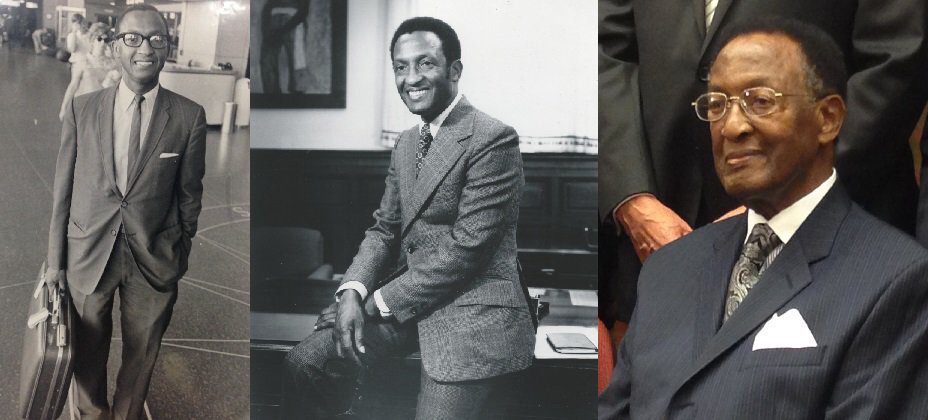Sterling Tucker: A Founding Father of Modern D.C.
By • July 22, 2019 0 1848

It often seems that life is unfair when public figures pass away at the end of a long life removed at a distance and their important achievements, and the impact of their presence in our lives is most remembered in a resurrected way.
So it seems with Sterling Tucker, civil rights activist, the first Chairman of the Council of the District of Columbia, who died at the age of 95 on July 14.
His life resume is both rich and full, but also in an odd way from a distant discreet and even dignified, demanding respect without ado and noise, which resembles his persona.
His record—his youth—would always seem to indicate that he had projected himself into the arena of public service. He was born in 1923 and grew up in Akron, Ohio, a classic Midwestern mid-sized American city, graduating from the University of Akron with a BA in sociology, and earned a master’s in psychology at the university, where he also met his future wife Alloyce.
Tucker went from Akron to joining the National Urban League, in Ohio, and then in New York, before joining the organization’s Washington office in 1956. The prominent civil rights institution—which promotes entrepreneurship and economic and political empowerment—seemed a match for Dixon’s sense and sensibility for African Americans, and an apt arena in which to move forward. One climatic achievement was the 1969 Poor Peoples Campaign, which he helped lead and organize with the Rev. Ralph Abernathy and Coretta Scott King, the widow of Dr. Martin Luther King, Jr., who had been assassinated the previous year.
That year, Tucker helped organize Solidarity Day which attracted 50,000 marcher.
He also dove deeply into the local political scene in the 1960s, which was on its way to Home Rule, serving on the Council of the District of Columbia—an appointed position then—from 1969 to 1974, and in 1974, with the coming of D.C. home rule, was elected to become the first Chairman of the Council.
There is always a pivotal moment in almost anyone’s life, a what if kind of breath that changes both a man’s direction and life, and in Tucker’s case, the political life of a city.
For Tucker, that moment came in 1978, when he ran for mayor of Washington, D.C., against the incumbent Walter Washington, who had been appointed by President Lyndon Johnson and won outright election to the post in the city’s first election, and the rising, often edgy and controversial political star Marion Barry, Jr.
The Democratic Primary Election in the heavily democratic city meant that the winner would become mayor, and there was little certainty about the outcome. Tucker was favored, considered to be a moderate and steady-as-you-go politician with a great deal of experience and the support of the city’s influential black ministers and the business community.
Barry came into the election as an at-large city council member and experience on the school board to which he had been elected president. He was also seen as a radical activist, having founded the activist group Pride, Inc., to help with jobs employment for the city’s young black community.
The liberal white community was attracted to Barry, while moderates seemed split between Tucker and Washington. Near the end of the campaign, the Washington Post endorsed Barry, seeing him as an avatar for real change in the city at large, a dynamic, inspiring personality and leader.
The endorsement, frankly described as possibly “risky” probably made the difference.
In the end, Tucker, who had been considered the favorite, finished second, losing to Barry by a scant 1,400 votes, with Washington finishing a close third. It was probably the closest mayoral election result in history.
History knows the result, too—the Barry years were tumultuous and often divisive. It’s hard to say what the political culture of the district would have been under a Sterling Tucker, most likely less of roller coaster, likely a little bit of more like a continuance of previous years. Hindsight is just hindsight, after all.
Tucker went on to continue to be a visible political figure in the community and served as chair of the board of the Washington Metropolitan Area Transit Authority in 1977. He formed his own consulting firm in 1981. In 1989 and 1990, he served as director of the D.C. Drug Control Policy.
Tucker is survived by two daughters and four grandchildren.
With or without the pivotal moment, his life seems full, eventful, and consequential.
He will lie in repose, 11 a.m. to 3 p.m., Tuesday, July 23, at the Wilson Building, where he had spent a good part of life proposing, making ideas become reality, working for the city. Both the city council and the mayor announced characterizing him as the man, “who was the founding father of the District as we know it.”
He will be celebrated, going from a high place during the course of his life to a higher place, in services at the Washington National Cathedral at 10 a.m., Thursday, July 25.

